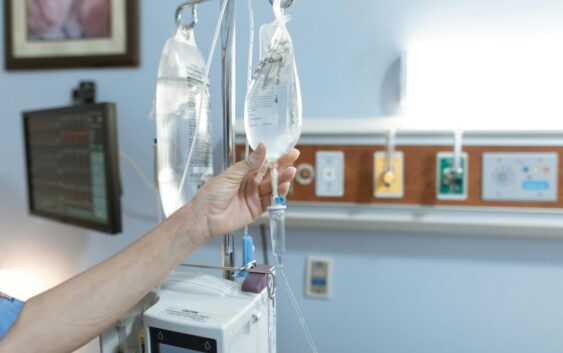- NC burn ban lifted statewide as rain improves wildfire conditions
- Western NC wildfire risk will 'get worse, not better' Ag Commissioner says, pressing lawmakers for help
- Watering trees is a must to protect them from severe weather and drought
- At least 4 dead, hundreds rescued after deadly floods ravage South Texas
- Today on Texas Standard: Deadly floods swamp South Texas, shatter records
IV fluid shortage caused by hurricane to last for months

Health care providers across the country are conserving IV fluid – liquids that help hydrate or deliver medicine directly into a patient’s bloodstream – in the face of a nationwide shortage. In Texas, some hospitals have suspended elective surgeries to deal with the shortage, while others are cutting back on the amount of fluid used in each procedure.
The cause of the problem is Hurricane Helene, which flooded the area around a facility in North Carolina that makes the majority of certain IV fluids. The Biden administration has invoked the Defense Production Act to get the plant back online as fast as possible, but hospitals are preparing to ration certain fluids for months.
Joseph Choi, a healthcare reporter for The Hill, spoke to the Texas Standard about the effects of the shortage so far.
This transcript has been edited lightly for clarity:
Texas Standard: This facility we’re talking about is owned by a company called Baxter International. Could you describe just how much control they have over IV fluids in the United States?
Joseph Choi: Baxter controls, in their own words and according to stakeholders, roughly 60% of the IV fluids used by U.S. hospitals every day.
And among those products, they also control about 50% of peritoneal dialysis fluid. Those are patients who do their own dialysis at home. And that has had major implications for a very specific subset of patients as well.
It sounds very serious. How has this shortage affected patients so far?
We’re still in the early parts. It takes some time to make its way through the supply chain. But in the immediate aftermath, hospitals and providers were told to expect anywhere between 40% or 90% of what they would normally get – so the immediate effects are fairly acute.
However, industry groups highlighted this issue and brought it to attention very quickly. So efforts have been made to mitigate that problem as much as possible.
» GET MORE NEWS FROM AROUND THE STATE: Sign up for Texas Standard’s weekly newsletters
The Biden administration has invoked the Defense Production Act. What else is the federal government – or private industry – doing to manage the effects of this shortage?
In the private market, other facilities are stepping up to try to make more product. And we saw that when Hurricane Milton went through Florida. There’s another manufacturer called B. Braun that is actually another top IV solution manufacturer in the U.S., and they actually partnered with a government agency to move the supply of IV fluids they had at their Florida facility out of the way of Milton and then bring it back for distribution.
Other companies say they are amping up production. The FDA has declared a shortage of certain products, and that gives hospital compounding pharmacies the flexibility to prepare their own IV fluids.
And the FDA has relaxed temporary imports for products overseas – and that’s for Baxter International in particular, as they’re ramping up production in their global facilities.
Any idea how long this could last?
That’s hard to tell. Baxter has said they’re not really expecting to be at full capacity until at least the end of the year. So I think a few months is safe to say, considering how much Baxter controlled in the industry.
That’s another issue in and of itself … this is a symptom of other issues in how manufacturers aren’t incentivized to make these crucial products – you know, IV fluid and peritoneal dialysis fluid, they’re not very profitable. So that’s how you end up with this situation where only a few manufacturers are making them.
Looking ahead, any idea how they might try and get more companies online, so if one is knocked off, we have more supply?
I can’t really speak to that. It’s kind of an evolving situation. But most companies who work in the IV fluid space – there’s also ICU Medical – they are all very aware of the situation, and they’re all ramping up their own production.
Thankfully, ICU Medical and B. Braun, they have facilities that were not hit by hurricanes or affected by hurricanes, and they say that those facilities are ramping up production.
But again, it takes time for products to get through the supply chain. And so in the immediate time, I think people should expect interruptions to their care or interruptions to their access to product. But hopefully the early warning signals and the mitigation efforts that have been made will help lessen that impact.